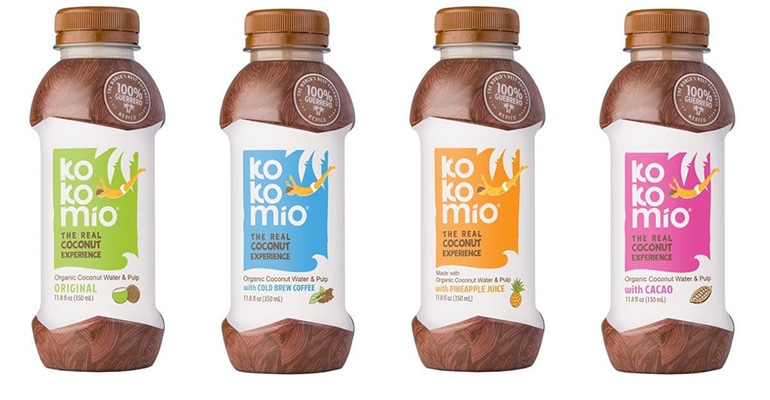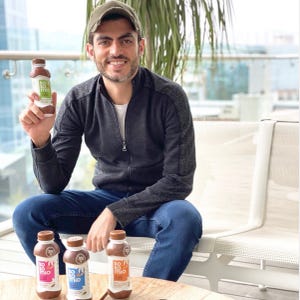Kokomio debuts sustainable coconut husk shipping material
Here's how Kokomio discovered a vastly eco-friendlier way to ship its perishable products.
March 8, 2021

Consumers often think of coconut milk as a better-for-you, vegan product. Yet the industry overall is plagued by reports of deforestation, animal cruelty, inadequate worker wages and impoverished working conditions. It’s a painful truth—one many consumers are unaware of.
Guerrero, Mexico-based beverage company Kokomio wants to change that. Co-founder, CEO and “Head Coconut” Alan Cohen grew up spending summers on the sunny beaches of Acapulco, where he remembers enjoying fresh coconuts picked straight from local palm trees. Inspired by the town’s legendary (and courageous) cliff divers, he started Kokomio, a creamy coconut beverage that uses both the milk and pulp of the fruit, to bring the spirit of Mexico to the masses.
 “We are committed to developing clean and sustainable products covering three important aspects: people, environment and business,” said Cohen (left). “This is our vision of sustainability.”
“We are committed to developing clean and sustainable products covering three important aspects: people, environment and business,” said Cohen (left). “This is our vision of sustainability.”
As part of that vision, the Kokomio team recently announced a new process that will transform spent coconut husks into shipping materials used for transportation of their beverages.
“As we started manufacturing, we found the amount of waste from the husks and the shells was huge—and if we are a small company, then just imagine the amount of waste coming from the industry as a whole,” Cohen said. “Because sustainability is a core foundation of Kokomio, we could not allow this to happen, and we soon discovered an important new use for our husks.”
At the onset of the COVID-19 pandemic, the company expanded the e-commerce side of the business, but found that shipping a perishable product in an eco-friendly way was a formidable challenge.
“After testing our coconut fiber from the husk waste, we found it has amazing insulation properties,” Cohen said. “This was a significant discovery for our sustainability process, since more and more people are buying their groceries online.”
The coconut husks are augmented with a natural agglomerate to hold them together and improve function, eliminating the need for styrofoam peanuts and other petroleum-based packaging materials. Refrigerated product is then placed inside a box with the husk insulation and an ice gel pack. The packaging can hold the cold chain for about 72 hours with an average external temperature of 77 degrees Fahrenheit and 60 hours at 90 degrees Fahrenheit.
Kokomio will use the new materials to ship its entire product line, which includes four flavors. The Guerrero-grown coconuts Kokomio uses have a low natural sugar content—about three times less than coconuts grown in Thailand, for instance.
Since coconut husks are a natural fiber, they can be reused in several ways such as mulch, compost or as a base for planting seeds. The packaging material can also be reused for the same purpose—insulation. “This development will help us move forward in using 100% of the coconut, and could also allow other companies to reduce the amount of pollution from packaging materials.”
In addition to the company’s sustainable packaging efforts, Cohen points to additional factors he says makes beverages made with Mexico-grown coconuts a more eco-friendly choice for the North American market.
“Our Guerrero-grown coconuts are hand-picked at their prime and bottled locally without ever leaving Mexico,” said Cohen. “They go from tree to bottle within three to four days.” Being closer to the U.S. market reduces the carbon footprint created by cargo ships coming from Asia, where 90% of the coconuts used to make coconut-based beverages available in the U.S. today are grown.
“In addition, we create job opportunities for people in Guerrero by not using animals to harvest,” Cohen said. “We also help our farmers acquire technology that improves the coconut farming process, making it sustainable at the source.”
Cohen emphasized that being vertically integrated helps Kokomio adhere to its mission of making sure whatever it creates helps people, the environment and the business. The company employs 40 people at its 10,000-square-foot manufacturing facility in Mexico City and supports 10 families of growers and harvesters. This family-owned business has aggressive plans to grow its distribution footprint throughout 2021.
“We’ve discovered that consumers in the U.S. are thirsty for a fresh, real coconut beverage, with less natural sugar, made closer to home from Mexico,” Cohen said. “But they’re also highly interested in supporting products that are developed from a population with humanely treated animals and workers. We’ve been able to accomplish that with Kokomio.”
About the Author(s)
You May Also Like


